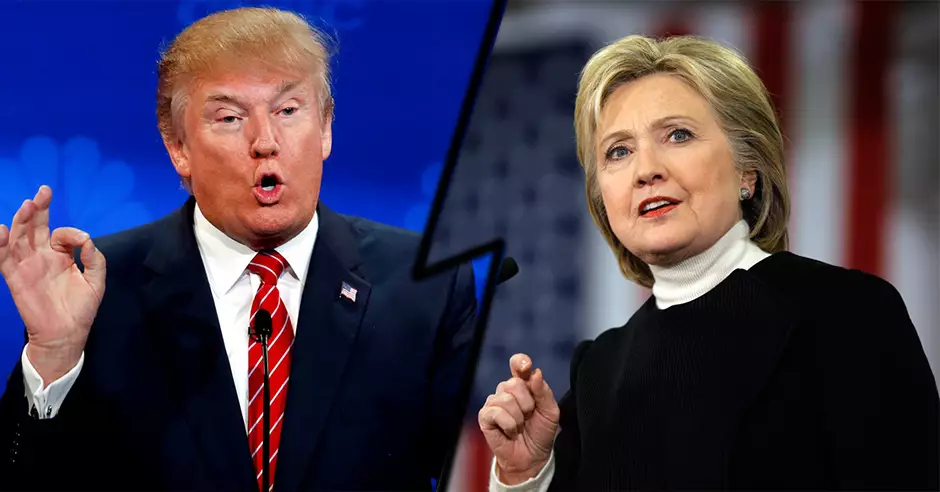
In any ordinary debate, by any ordinary standards, Hillary Clinton would be judged to have come out on top in what marked the beginning of the end of an already 16-month long campaign to find the next President of America.
But, such is the way that Donald Trump has changed the texture of American politics, that as the Republican candidate and Democrat Hillary Clinton walked off stage at Hofstra University in New York following the first of three live televised debates, it remained impossible for commentators to judge who had won and who had lost in the eyes of the American public.
Pollsters suggest that though these events rarely change the entire course of elections, they do offer candidates the ability to shift the momentum of the contest.
Advert
Early in the debate Trump emphasised that he would bring in "the biggest tax cuts since Reagan" - cutting taxes for small and big business from 35% to 15%. In contrast Clinton promised to raise taxes on the wealthiest Americans, who she said should "pay their fair share."
There are two very different visions of America, Clinton's vision - pressed by the grassroots within her party - is the furthest to the left to be offered by a candidate for decades, Trump's the furthest to the right.
On the economy, Trump said that jobs were "fleeing the country" and blamed poor trade deals for this, in response Clinton pledged to increase investment and promised to create 10 million jobs.
"We are in a big, fat, ugly bubble," Mr Trump responded, describing the state of the US economy, blaming Mrs Clinton as "all talk, no action".
Advert
A poll conducted in the lead up to the debate, by NBC News and SurveyMonkey, showed Hillary Clinton leading her rival by 5 points - or 45% to 40% - a lead that has narrowed following concerns over the former Secretary of State's health.
But unable to cut off or shout over his opponent, Trump showed that he would be unable to replicate the successes he had enjoyed over more experienced candidates in the Republican Primaries, with Clinton's cool, rational debating style allowing her to make her points clearly in spite of her Republican rival's interruptions.
Advert
Beforehand Clinton had lost support due to the on-going scandal over the leaking of private emails she had used for official communication during her tenure as Secretary of State, and as the debate progressed towards its middle stages Trump attacked his Democratic opponent on this issue, saying of the email scandal: "The country really thinks it's disgraceful, believe me."
Throughout the debate Trump painted himself as the anti-establishment candidate, emphasising Clinton's 30 years in office and saying that she had failed to enact change - turning Hillary's advantage of experience against her. However, Trump only really looked comfortable when he was on the attack, failing to offer as many political policies or solutions to America's problems as he did criticisms of current policy.
When put on the defence, for example when pressed by the debate's mediator Lester Holt about his failure to release his tax returns publicly - the first presidential candidate to not do so in 40 years - Trump's response was to attack his opponent further, replying that: "[he] would release his tax returns against his lawyer's wishes when she released her 33,000 emails that were deleted."
Before
the debate the Republican candidate had gone as far as to question
legitimacy of NBC News's Lester Holt as
as a moderator, branding the anchor a 'Democrat',
although it later transpired he was in fact a registered
Republican. As you would expect, Holt's moderation of the contest
offered no hint of bias, but at times he seemed unable to control
proceedings with both candidates frequently talking over each other.
Advert
On foreign policy, as with all issues of policy, Clinton looked the stronger of the two candidates, saying that she had a plan to defeat ISIS, and part of that plan was about defeating them online. Mrs Clinton also attacked her rival for praising Russian President Vladimir Putin.
She said: "I was so shocked when Donald publicly invited Putin to hack into Americans. That is just unacceptable... Donald is unfit to be commander-in-chief."
Advert
Nearing
the end of the debate, as argument got more personal, Trump said
Clinton did not have the right look and that she did not have the right 'stamina' to lead America.
Responding by again emphasising her experience, she said that the second he visited as many countries as her, negotiated as many peace deals, and negotiated the release of dissidents like she had - he could talk about stamina.
It is estimated over 100 million viewers watched the debate between two candidates, surpassing the previous record of 80.6 million viewers for the 1980 contest between Jimmy Carter and Ronald Reagan 36 years ago. For all Donald Trump's failure to offer a vision of what American would look like under his leadership beyond it becoming 'great again', it is unclear whether Hillary's focus on experience and policy will work in her favour.
At the end of the day, Trump's appeal is not to the political rationale or political solutions - his tactic is to criticise what exists now. Put simply, to many of his supporters he does not need to offer policy in the same way as Clinton does - he simply needs to say, 'things can't get much worse'. In Britain we have already seen an 'anti-establishment' vote win once this year, as American voters go to the polls on 8 November it remains to be seen whether we will see a second.
Featured Image Credit: